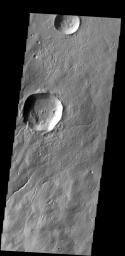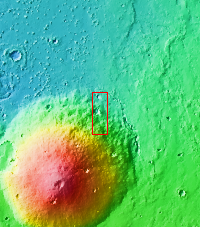
|
Into the Crater
- Click the image above for a larger view
- Full-Res JPEG (1427 x 2927) (353.0 kB)
- Full-Res TIFF (1427 x 2927) (4.2 MB)
Caption:
Several channels are located on the flank of Hecates Tholus. In this VIS image one of those channels enters a crater, creating a deposit on the floor of the crater. Age relationships can be derived from this image. Hecates Tholus was formed first, then the crater was created, and finally flow of lava or water carved the channel that bisects the crater rim.
Orbit Number : 53575 Latitude : 33.1381 Longitude : 151.349 Instrument : VIS Captured : 2014-01-11 06:19
Background Info:
Please see the THEMIS Data Citation Note for details on crediting THEMIS images.
NASA's Jet Propulsion Laboratory manages the 2001 Mars Odyssey mission for NASA's Science Mission Directorate, Washington, D.C. The Thermal Emission Imaging System (THEMIS) was developed by Arizona State University, Tempe, in collaboration with Raytheon Santa Barbara Remote Sensing. The THEMIS investigation is led by Dr. Philip Christensen at Arizona State University. Lockheed Martin Astronautics, Denver, is the prime contractor for the Odyssey project, and developed and built the orbiter. Mission operations are conducted jointly from Lockheed Martin and from JPL, a division of the California Institute of Technology in Pasadena.
Cataloging Keywords:
| Name | Value | Additional Values |
|---|---|---|
| Target | Mars | |
| System | ||
| Target Type | Planet | |
| Mission | 2001 Mars Odyssey | |
| Instrument Host | Mars Odyssey | |
| Host Type | Orbiter | |
| Instrument | Thermal Emission Imaging System (THEMIS) | |
| Detector | ||
| Extra Keywords | Crater, Grayscale, Thermal, Water | |
| Acquisition Date | ||
| Release Date | 2014-02-28 | |
| Date in Caption | 2014-01-11 | |
| Image Credit | NASA/JPL-Caltech/ASU | |
| Source | photojournal.jpl.nasa.gov/catalog/PIA18028 | |
| Identifier | PIA18028 | |

